UVP 005: Zoo & Wildlife Veterinarian Dr. Carlos Sanchez
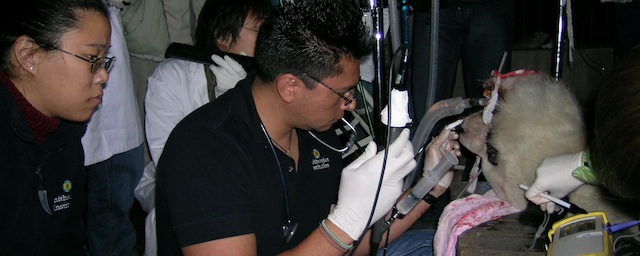
Look at this — two podcast episodes in two weeks!
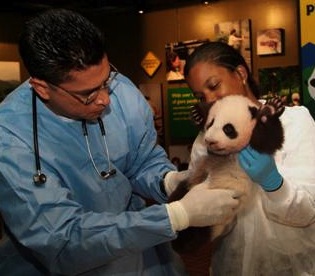
I’m so excited to share this discussion with my friend and mentor, Dr. Carlos Sanchez. Dr. Sanchez is a senior associate veterinarian at the Fort Worth Zoo, but I first got to know him during my externship at the National Zoo in Washington, D.C.
I’ve been consistently impressed with the openness and helpfulness displayed by almost all the uncommon veterinarians I’ve interacted with, but Dr. Sanchez really goes above and beyond in helping people like you and me. This sincere desire to support other veterinarians and students is clearly evident in our conversation.
Dr. Sanchez grew up in Mexico and was the first Latin American veterinarian to ever be selected for a zoo medicine residency program in the U.S. He is especially passionate about helping other students and veterinarians from less affluent parts of the world figure out how to get the training they need in this field.
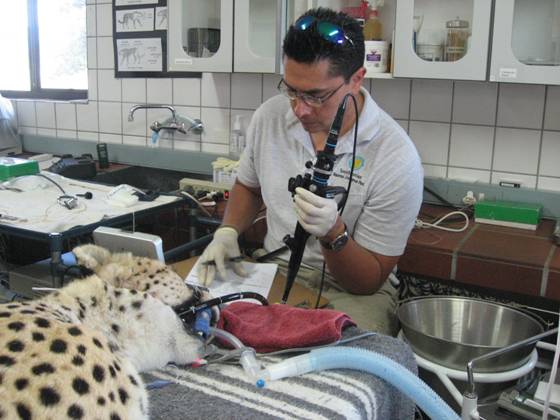
Links We Mentioned
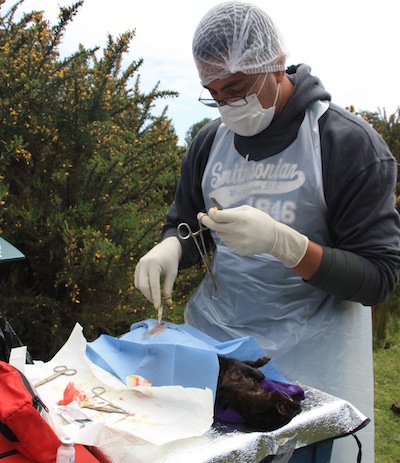
Smithsonian National Zoological Park training: Dr. Sanchez completed his residency training at the National Zoo, and I met him there while doing a formal preceptorship during my final year of veterinary school.
Dr. Sanchez mentioned several students and veterinarians who made important personal connections with great career results at the annual conference of the American Association of Zoo Veterinarians. The 2013 meeting is from September 28 – October 4 in Salt Lake City, Utah. He also speaks highly of the annual international conference of the Wildlife Disease Association.
You can read more about this valuable concept on my posts about attending a zoo and wildlife medicine conference and a veterinary epidemiology conference in Australia.
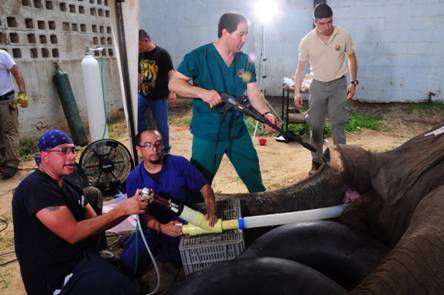
The Wild Animal Health Masters (MSc) program at the Royal Veterinary College in London provided Dr. Sanchez’s introduction to formal training in English and paved the way to his selection for the zoo medicine residency. Students from a number of countries around the world can apply for a full scholarship to cover all expenses for this and other masters degree programs at the RVC.
You can find all the information you need about the chimpanzee clinical training course that Dr. Sanchez will be assisting with in Zambia this fall at this recent post on my blog.
The Educational Commission for Foreign Veterinary Graduates (ECFVG) has an extensive website with all the information needed to understand the requirements to become licensed to practice veterinary medicine in the United States.
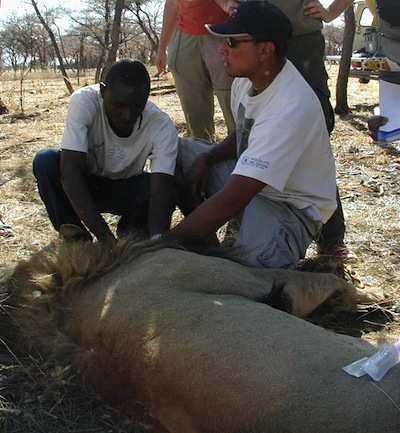
Dr. Sanchez has assisted on several projects with the Cheetah Conservation Fund in Namibia. You can learn about veterinary student (and other types) of internships with the program here.
The Fort Worth Zoo, where Dr. Sanchez is now working, recently opened up its veterinary student preceptorship program.
What You Will Learn in This Episode
- how Dr. Sanchez was able to get a masters degree at the Royal Veterinary College for free
- the things Dr. Sanchez loves and hates about being a zoo veterinarian
- why Dr. Sanchez thinks attending a relevant conference can be one of the best ways to get a foot in the door in the field of zoo and wildlife medicine (and how he has personally seen this work multiple times)
- specific numbers detailing how Dr. Sanchez’s salary has grown from his time as a resident to now in his current position
- what foreign veterinary graduates need to be aware of as they search for internship and residency programs in the U.S.
- why Dr. Sanchez believes that a career in zoo and wildlife medicine is possible for anyone who wants it!

The Interview
You can watch the video of our conversation right here, but keep scrolling down for the audio version which you can download for more convenient listening in the car, at the gym, or while you’re out walking the dogs. This episode clocks out at about 35 minutes.
The audio podcast also has a little bit higher production quality, with my best radio personality voice on the introduction and original music from my little brother Jonathan.
Thank you to everyone who has rated the podcast or left reviews for it on iTunes! If you haven’t had a chance yet, take a minute to head on over to leave an honest review. I really appreciate your support.
Do you have any questions for Dr. Sanchez or me after listening to our conversation? Let us know in the comment section below!
Podcast: Play in new window | Download | Embed

Comments
WOW. Now THAT is determination. Thank you Elliott and thank you Carlos for the inspiration!.
Question: Do you think it is realistic for me to pursue wildlife vet work if I will not even be starting vet school until age 52? It sounds like a long road from here to there. I am not interested in having a small animal practice. My passion is wildlife med/conservation. I’d appreciate honest feedback about my age vs. time invested. Thanks!
Hey Gayle, thanks for your question. I think a lot of the answer would depend on how long you see yourself working after finishing all your training. Many people now continue working into their 70s, so I don’t think this is unrealistic at all. Also, I think that you would need to see the process as something fun and worthwhile, along with the ultimate end goal. You should be able to have some cool experiences in wildlife medicine through vet school, and if you go for a residency or PhD program after that you would be getting your hands even more dirty with the real thing. Maybe Carlos will chime in here too…
Thanks Elliott. After one of those long days as a first year vet student, this was exactly what I needed to watch. You’re the man!
Mike, I’m glad it hit the spot for you! I remember those long days from first year of vet school, and I have to admit that I’m glad they’re long behind me now.
Hi Gayle, thanks for your words; as far as your question goes the honest answer is: yes, it is a long road for sure, but also it is totally possible to do it. What Elliot mentioned about how long you want to work after finishing vet school and any training you pursue afterwards is very important. Age shouldn’t be a limitation at all, other factors such as financial situation and obligations, moving flexibility (to pursue opportunities in other states/countries), and even personal life need to be factored in to set up individual realistic expectations for each of us.
I always tell my students that it may take longer and be harder than expected (to get to that point on your career where you wanted to be) but if the commitment is there then it will happen.
Remember that are many ways to get there (to work on wildlife medicine and or conservation) and vet school, followed by internship(s) or MSc and a residency is only one way to accomplish this. There are plenty of non-vets out there doing phenomenal work with wildlife health and diseases ( Fied biologists, Biologists with PhD on epidemiology, ecology of diseases, Public health, etc). That’s why I find the Wildlife Disease Association so exciting, is a real interdisciplinary conference where you see all kind of professionals working towards the same goal; Wild Animal Health.
Good luck on your professional adventures Gayle.
Thanks
Carlos
Hi Elliott and Carlos!
Thank you both AGAIN for your replies. I so appreciate you taking the time to respond, and also the food for thought about various paths to the same end–wildlife/conservation.
All the best to you both!
Gayle
Hi, I actually live in Dallas and I was volunteering as a keeper’s aide at the Dallas zoo. I really was looking to volunteer on the hospital side, but those spots seems few and far between. I was wondering if Dr.Sanchez knew of any volunteer opportunities at the Fort Worth zoo? I just applied to several vet schools this cycle, mainly with the interest of veterinary research, but I am become increasingly interested in exotics after volunteering at the zoo. I’m especially interested in reproductive biology, since I was able to dabble in that as a technician in private industry company. If he has any ideas or would be willing to talk more, I’d be very grateful! Thanks 🙂
Good to hear from you, Erica. I think it is pretty tough to find a volunteer position at any zoo that will allow you to spend much time with the veterinarians before you are in vet school. I volunteered at the National Zoo in high school and college but it was always on the keeper side of things, and I finally got to do the veterinary externship in my final year of vet school. That said, I always think it is worth trying!
Reproductive biology is a really important area for conservation and zoos. You might have more success trying to get an internship or some type of study program in this area than in a vet hospital. Take a look at some of the stuff offered at the Smithsonian’s Conservation Biology Institute here: http://nationalzoo.si.edu/scbi/
Thanks Elliott, I appreciate the link and will definitely look into that for the future. Sorry for the late response, I’ve been wrapped up in work. Also, right after I wrote that last post, I was able to snatch a volunteer gig in the Dallas zoo hospital after all. I start tomorrow, so we shall see how it goes!
Congrats Erica! I hope it’s a lot of fun.
Hello Elliot,
Sorry I missed this article, I was studying for the NAVLE -.-
Anyways, how can I contact Dr Sanchez directly? I also want to become a wildlife veterinarian, I am currently enrolled in the ECFVG certification program and I am from a latin american country as well! I feel like we have much to talk about!
Karla, it’s been a while! I hope all your studying went well. I’ll e-mail personally with Dr. Sanchez’s information, as I know he would love to help you get connected to the community.
I LOVE Dr. Carlos Sanchez, I’ve seen him several times on TV on “Zoo Vets”!! As an animal behaviorist, I have aspired to working with zoo animals in terms of helping to prevent behavior problems from occurring, decreasing already existent behavior problems and incorporating environmental enrichment for all animals in the zoo. However, I’ve been unsuccessful in being able to get a job in a zoo as a behaviorist even after volunteering with my local zoo, such a bummer.
To Dr. Sanchez – way to go making headway for Latin American veterinarians and the animals they care for. I have been to Costa Rica & Belize, I love Latin America!! I did my MSc in the UK also!!
I love your enthusiasm, Monique! Yes, Dr. Sanchez is definitely an inspiration to many. I’m sorry you have found the right position yet as a behaviorist in a zoo setting. Keep applying!
Thanks for your kind words Monique. I’m sure that sooner or later you will find a rewarding position; like Elliott says, keep applying and remember: if it was easy, everyone would do it.
Unfortunately, not many zoos have behaviorist but the field (of zoo-animal behavior) is a growing one. Zoo Biology has published several articles on this topic in the past few years. You may want to contact some of the authors of those papers to ask for advice on how to get there.
Best luck!
Thank you for the reply and great advice. I just saw your reply now!
Hello Elliot,
This your page is now like a social media to me. It has been something that incredibly motivates me to never give up on my dream of working with wildlife as a zoo clinician. Dr. Sanchez has inspired me to keep fighting for my dream and never give up. He also answered a lot of questions I had in regard to being a wildlife vet! Since I am of Latin descent, I also feel like I can relate to Dr. Sanchez. All of this would have not been possible if it was not for your outstanding podcast that contains a vast amount of tips for future wildlife clinicians. I can not thank you enough. I will keep exploring your blogs to gain even more motivation to help my dream come true.
Thank you,
Kimberly Guzman